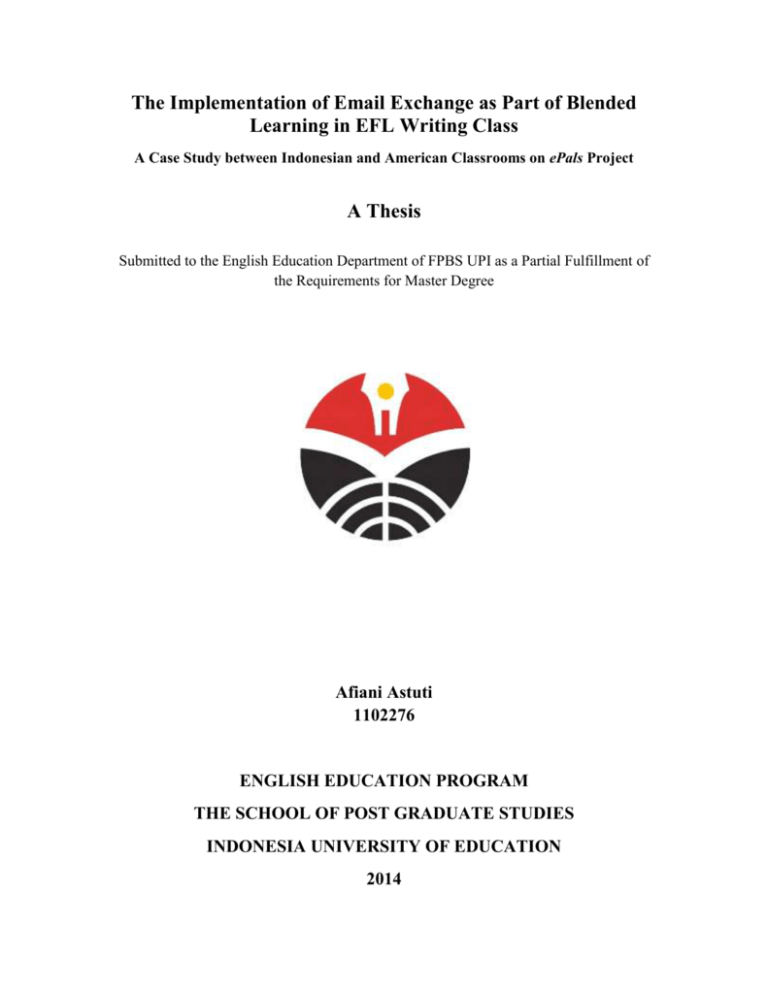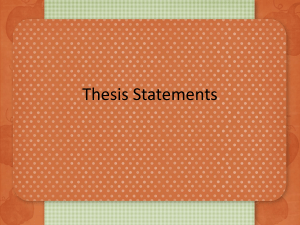A Thesis - repository@UPI
advertisement

The Implementation of Email Exchange as Part of Blended Learning in EFL Writing Class A Case Study between Indonesian and American Classrooms on ePals Project A Thesis Submitted to the English Education Department of FPBS UPI as a Partial Fulfillment of the Requirements for Master Degree Afiani Astuti 1102276 ENGLISH EDUCATION PROGRAM THE SCHOOL OF POST GRADUATE STUDIES INDONESIA UNIVERSITY OF EDUCATION 2014 The Implementation of Email Exchange as Part of Blended Learning in EFL Writing Class A Case Study between Indonesian and American Classrooms on ePals Project Oleh Afiani Astuti S.Pd UPI Bandung, 1999 Sebuah Tesis yang diajukan untuk memenuhi salah satu syarat memperoleh gelar Magister Pendidikan (M.Pd.) pada Fakultas Pendidikan Bahasa dan Seni © Afiani Astuti Universitas Pendidikan Indonesia January 2014 Hak Cipta dilindungi undang-undang. Skripsi ini tidak boleh diperbanyak seluruhya atau sebagian, dengan dicetak ulang, difoto kopi, atau cara lainnya tanpa ijin dari penulis. APPROVAL PAGE This thesis entitled “The Implementation of Email Exchange as Part of Blended Learning in EFL Writing Class - A Case Study between Indonesian and American Classrooms on ePals Project” has been approved by the supervisor. Approved by Supervisor Prof. Emi Emilia, M.Ed., Ph.D. DECLARATION I hereby certified that this thesis, which is entitled “The Implementation of Blended Learning in EFL Class - A Case Study between Indonesian and American Classrooms on ePals Project” is truly my own work. I am fully aware that I have cited and quoted some statements and ideas from a great number of sources, all quotations have been acknowledged in this paper. Bandung, December 2013 Afiani Astuti PREFACE All praises and submissions be to Allah the Most Exalted, The Lord of the universe. May the choicest blessings and peace of Allah be upon the last Messenger and Prophet, Muhammad S.A.W. By His blessing, this thesis is made as a completion of the master degree in English education in Indonesia University of Education. This thesis investigated the writing improvement through bended learning in EFL writing class among Indonesian and American students. The blending of face-to-face and online interactions was incorporated in the teaching program. The online interactions with American students (English native speakers) and face-to-face interaction with peers in the EFL writing class gave impacts on the students writing development. Another point of investigation in this thesis was the responses from both groups of students, Indonesian and American, to the teaching program. The responses were not only represented in the questionnaires but also in their texts (email). Students wrote their emails and complied with all the terms and condition in the project. Students’ emails were part of the responses to the teaching program. The responses from the questionnaires from different groups of students were aimed at different target. The questionnaires for Indonesian students targeted their improvement in their writing and the teaching program but for American, the target was on their perception on the teaching program and interaction with Indonesian students. The research findings presented in this thesis hopefully gives major benefits and valuable contribution to EFL teaching and learning, especially to those who try to apply ICT in their writing classroom for authentic learning. Chapter 4 in this thesis shall guide the teachers to practice the teaching program offered. The issues, challenges and anticipation are provided for teachers to have far better implementation of blended learning in this study. The writer would be pleased to accept constructive criticism and suggestions from the readers. Bandung, December 2013 Afiani Astuti ACKNOWLEDGEMENTS It would not have been possible to write this thesis without Allah’s will, the helps and supports from the compassionate people around me, to only some of whom it is possible to give particular mention here. My first and foremost thanks go to my great supervisor, Prof Emi Emilia, M.Ed., Ph.D. who has been a constant source of knowledge, strong encouragement and sustained critical support for the whole course of the study. The constructive advice and support from my special supervisor has been invaluable on both academic and personal levels, for which I am extremely grateful.It has indeed been a great privilege to work under her guidance, especially during the thesis supervision. I am really proud to witness her greatest success in her academic life by earning her professorship which made every step on the completion of the thesis as easy as possible. It was particularly kind of her to allow me to refer to her collections of references on research and Systemic Functional Grammar. I would like to thank Jon Darkow and his students in Seneca East High school, Ohio - USA for the friendship and support during the ePals project. I remember the generosity and enthusiasm of the students that I sadly never met in person. To my Secondary 4 students in Al-Irsyad Satya Islamic School of 2012 who were very cooperative and enthusiastic in writing their emails during the project, I can’t thank them enough for their active participation during the data collection. Amongst my fellow teachers in English department in Al-Irsyad Satya Islamic School who showed their patience and understanding for my absence during the department meetings. Special thank to the principal, Ms. Indri Rini Andriani who always gives me support and privilege during my thesis writing and to my colleague, Mr. Sanusi for contributing his excellent knowledge of grammar during my proofreading time. Last, but by no means least, I want to extend a special gratitude to my family: to my husband, Sudarsono and my only daughter, Laratri Izra Fathirrabani, for her support to a mother whose attention was distracted during her stay in pesantren. To my beloved mum and dad for their endless love and prayers and to my sister, Salmia Nur Adiani who also served as a proofreader. It is such a great pleasure that to them all I dedicate this thesis.









